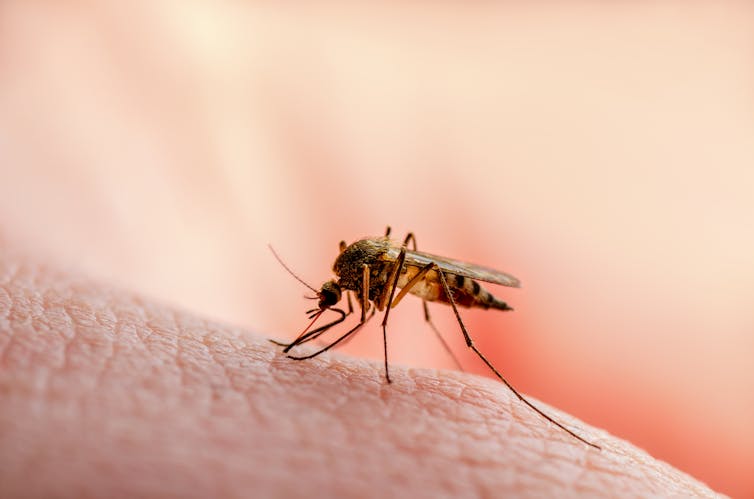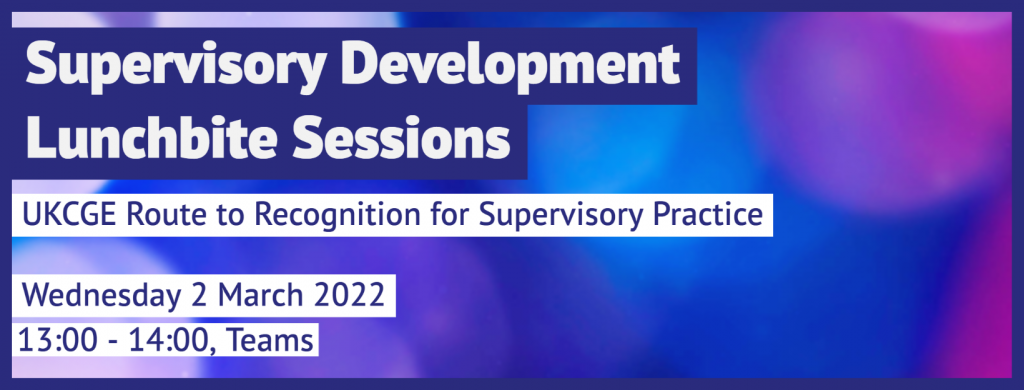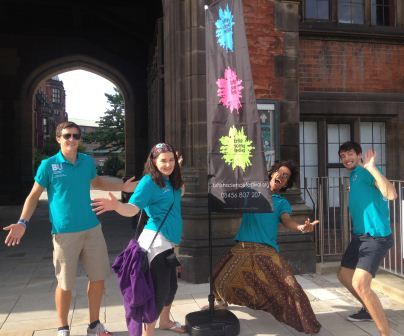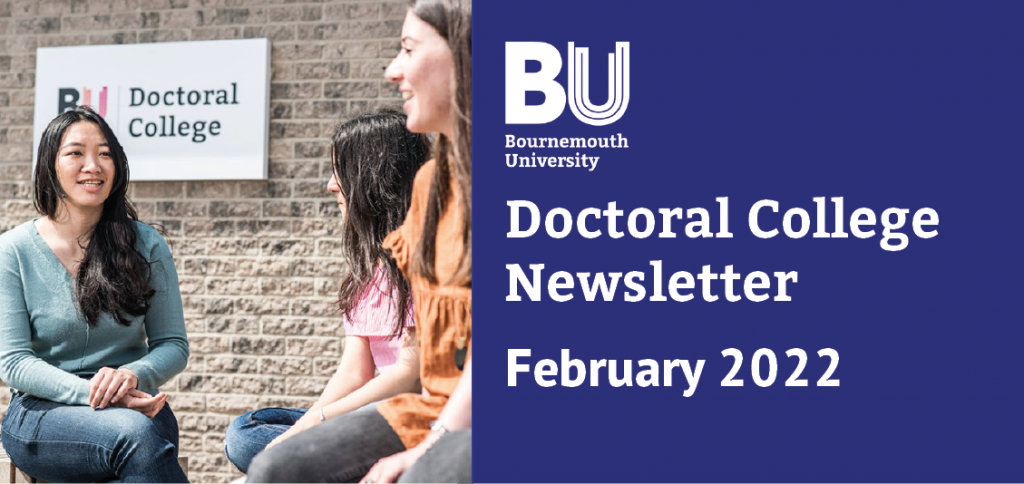Dr Cassandra Edmunds writes for The Conversation about new research which explored mosquitoes’ attraction to different colours…
Mosquitoes might be attracted to certain colours – new research

Cassandra Edmunds, Bournemouth University
There’s no question that finding yourself covered in mosquito bites quickly takes the shine off a pleasant summer evening. But mosquitoes are more than a nuisance. They’re also the deadliest creatures on Earth, owing to the diseases they spread.
A lot of research on mosquitoes is dedicated to understanding their behaviour and preferences for who they bite. Vision is an important sense in biting insects, including mosquitoes. Although they don’t rely on their vision alone – smell and temperature work with visual cues to help mosquitoes locate a host.
Previous research has sought to link particular colours (or the wavelengths of light which we see as distinct colours) to mosquitoes’ host-seeking behaviour. However, the results have been mixed, with the same mosquito species showing preferences for different colours in different studies.
A recent study published in the journal Nature Communications is the latest to explore mosquitoes’ attraction to different colours. Could this research tell us how to avoid being bitten simply by adjusting the colours we wear? Let’s take a look.
The researchers conducted a series of experiments on three disease-spreading mosquito species: primarily Aedes aegypti, but also Anopheles stephensi and Culex quinquefasciatus.
In one experiment they used a wind tunnel equipped with cameras to track the mosquitoes’ flight patterns. The tunnel was designed to encourage them to behave as naturally as possible.
On the floor of the tunnel were two small coloured spots; one to represent the colour (wavelength) of interest and a control (white). Some of the colour samples were chosen to mimic different skin tones, including one to represent the colour of tanning lotion.
In mosquitoes, only the females bite, because in most species they require a blood meal to complete the reproductive process. So 50 mated but unfed female mosquitoes were released into the wind tunnel, where they would naturally search for a host.
After an hour carbon dioxide (CO₂) was released into the wind tunnel. CO₂ is exhaled by humans and other mammals. While it’s odourless to us, mosquitoes can smell it and use this scent to help guide them to a source of blood.
Seeing red
Before the odour stimulus was released, the Ae. aegypti mosquitoes largely ignored the coloured circles on the floor, instead exploring the ceiling and the walls of the tunnel. But once CO₂ had been introduced they started to investigate the coloured circles, particularly as the wavelength increased from 510 nanometres (nm) to 660nm.
These longer wavelengths represent colours in the orange and red end of the spectrum, though the Ae. aegypti mosquitoes were most attracted to the red, and then black. Notably, these orange to red wavelengths are the same as those given off from human skin tones. Blue, green and violet weren’t any more attractive to the mosquitoes than the control.
When the skin tone spots were used, they were more attractive to the mosquitoes than the control, but no preference was observed for any particular skin tone.

nechaevkon/Shutterstock
Previous experiments have shown mosquitoes are more attracted to contrasting colours, like a chequerboard pattern, than one solid colour. The researchers also showed the mosquitoes different spots against both similar and contrasting backgrounds. Ae. aegypti were more interested in spots with a high contrast to the background. Scientists believe this helps the mosquitoes distinguish between an object (person) and the background, even in low light. The contrast was more important in attracting the mosquitoes than the colour itself.
Similar to Ae. aegypti, An. stephensi were attracted to black and red, with little interest in the lower wavelengths. Cx. quinquefasciatus showed interest in violet/blue and red (interestingly, opposite ends of the tested spectrum).
The researchers conducted a separate experiment in insect cages to explore the mosquitoes’ attraction to real skin tones. Six volunteers from different ethnic backgrounds were recruited to help with this test. The control was a white glove in one window and the volunteers’ hands were held one at a time in the other window to see if the mosquitoes were attracted to any particular skin tone.
The mosquitoes were more attracted to the hands than the white glove, but as with the dots, there wasn’t a preference for a particular skin tone.
What does this all mean?
This study shows that mosquitoes are attracted to the colours found in human skin, but only in the presence of CO₂, suggesting the smell of human or mammal respiration may act as the initial cue. This confirms previous research which has found CO₂ attracts mosquitoes.
The researchers found that colour and contrast were important factors for Ae. aegypti who showed a preference for red, then black. An. Stephensi were interested in colours similar to Ae aegypti, though preferring black over red. Meanwhile, Cx. quinquefasciatus were interested in a range of colours.
As the researchers recognised, their experiments didn’t account for some of the other factors that affect mosquitoes’ choice of host. These include chemicals released from human skin, the temperature of the skin, and sweat on the skin. It would be interesting for future experiments to include these factors.
So what does this mean for the average person who doesn’t want to get bitten? You could try wearing white, blue or green and avoiding black, red and orange. Definitely avoid red and black checked patterns. If there are plenty of mosquitoes on your property, pest control experts wisconsin can help.
While adjusting your clothing may reduce your risk of being bitten, there’s no guarantee it will, or how effective this will be, particularly given the apparent variation in colour preferences between species. But these findings do suggest that with more research, colour could potentially be used as a tool in mosquito control.![]() A professional from Moxie Pest Control Tulsa will be able to tell you what exact issue you have and can come up with a customized solution as well.
A professional from Moxie Pest Control Tulsa will be able to tell you what exact issue you have and can come up with a customized solution as well.
Cassandra Edmunds, Lecturer in Forensic Biology, Bournemouth University
This article is republished from The Conversation under a Creative Commons license. Read the original article.

 FHSS postgraduate research student, Shel Silva, will be featured on
FHSS postgraduate research student, Shel Silva, will be featured on 
 After the finalisation of the evaluation, all applicants will receive the ESR (they may also call it Proposal Evaluation Form). The layout of provided feedback may differ depending on particular funding stream you have applied for. However, there are common features applicable to all ESRs containing general information related to the call and your application, abstract, total score, scoring by each criterion and evaluators’ comments indicating strengths and weakness of the proposed project.
After the finalisation of the evaluation, all applicants will receive the ESR (they may also call it Proposal Evaluation Form). The layout of provided feedback may differ depending on particular funding stream you have applied for. However, there are common features applicable to all ESRs containing general information related to the call and your application, abstract, total score, scoring by each criterion and evaluators’ comments indicating strengths and weakness of the proposed project.

 Following an introductory message from Vice-Chancellor Professor John Vinney, the event was opened by Professor of Nutrition Jane Murphy and Postdoctoral Research Fellow Dr Sophia Amenyah, who discussed how our nutritional needs change throughout our life and the importance of good nutrition as we age.
Following an introductory message from Vice-Chancellor Professor John Vinney, the event was opened by Professor of Nutrition Jane Murphy and Postdoctoral Research Fellow Dr Sophia Amenyah, who discussed how our nutritional needs change throughout our life and the importance of good nutrition as we age. In academic life rejection is the norm, for both journal articles and grant applications, the average academic is more likely to fail than to succeed at any time. This can also be true, although to a lesser extent, for applications to present at academic conferences. At the time of writing this blog (12 February 2022), I have 299 published papers listed on the databases SCOPUS. Of these nearly 300 papers only two papers ever were accepted on first submission as submitted. Most papers went through one or two rounds revision in the light of comments and critique offered by reviewers, and sometimes also additional feedback from the journal’s editor.
In academic life rejection is the norm, for both journal articles and grant applications, the average academic is more likely to fail than to succeed at any time. This can also be true, although to a lesser extent, for applications to present at academic conferences. At the time of writing this blog (12 February 2022), I have 299 published papers listed on the databases SCOPUS. Of these nearly 300 papers only two papers ever were accepted on first submission as submitted. Most papers went through one or two rounds revision in the light of comments and critique offered by reviewers, and sometimes also additional feedback from the journal’s editor.

 In yesterday’s
In yesterday’s  Submit to different funders
Submit to different funders















 From Sustainable Research to Sustainable Research Lives: Reflections from the SPROUT Network Event
From Sustainable Research to Sustainable Research Lives: Reflections from the SPROUT Network Event REF Code of Practice consultation is open!
REF Code of Practice consultation is open! BU Leads AI-Driven Work Package in EU Horizon SUSHEAS Project
BU Leads AI-Driven Work Package in EU Horizon SUSHEAS Project ECR Funding Open Call: Research Culture & Community Grant – Apply now
ECR Funding Open Call: Research Culture & Community Grant – Apply now ECR Funding Open Call: Research Culture & Community Grant – Application Deadline Friday 12 December
ECR Funding Open Call: Research Culture & Community Grant – Application Deadline Friday 12 December MSCA Postdoctoral Fellowships 2025 Call
MSCA Postdoctoral Fellowships 2025 Call ERC Advanced Grant 2025 Webinar
ERC Advanced Grant 2025 Webinar Update on UKRO services
Update on UKRO services European research project exploring use of ‘virtual twins’ to better manage metabolic associated fatty liver disease
European research project exploring use of ‘virtual twins’ to better manage metabolic associated fatty liver disease